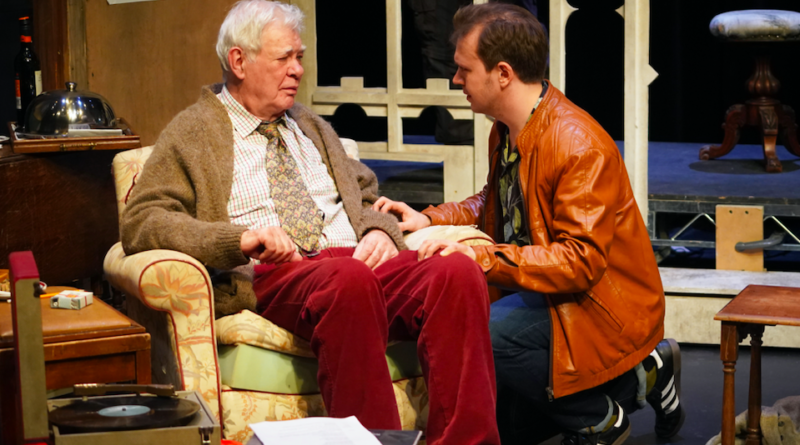INTERVIEW: Britten, Auden come into focus in ‘The Habit of Art’
Photo: The Habit of Art stars, from left, Matthew Kelly and Benjamin Chandler. Photo courtesy of Carol Rosegg / Provided by Matt Ross PR with permission.
The Habit of Art, Alan Bennett’s acclaimed new play, has arrived from the United Kingdom in Midtown Manhattan, courtesy of 59E59 Theaters and the Brits Off Broadway festival. The show, produced by Original Theatre, envisions an encounter between Benjamin Britten, the composer, and W.H. Auden, the poet. The subject, at first, is Britten’s new opera, Death in Venice, but eventually the two start talking about friendship, rivalry and heartache, according to press notes.
At the helm of this production is director Philip Franks, who is an actor himself. His stage work includes everything from The Rocky Horror Show to Witness for the Prosecution to The History Boys, another Bennett play. His directing credits are numerous, encompassing productions with the Royal Academy of Dramatic Art, Chichester Festival Theatre and Liverpool Playhouse, among many others.
Recently Franks exchanged emails with Hollywood Soapbox about The Habit of Art, which continues at 59E59 Theaters through Sunday, May 28. Questions and answers have been slightly edited for style.
Were you familiar with Benjamin Britten and W.H. Auden before reading Alan Bennett’s play? How much research did you have to conduct?
I knew a fair bit about both Auden and Britten, and already admired them both greatly. More the knowledge of an enthusiastic amateur than an expert, I would say. I did read a couple of biographies of each of them, and listened to some of the music, which I would have listened to anyway. I’m a big fan. In any case, it’s always useful to immerse yourself in the world of the play — you’d be foolish not to. However, the important research has been done by Alan Bennett. He is meticulously accurate but has also combined his in-depth knowledge with an imaginative take of his own, so there weren’t very many gaps to fill.
What did you like about The Habit of Art upon first reading?
The first reading of the play gives you the skill and the high polish and the wit of the author. It’s impossible to read it, I would say, without laughing out loud. However, the real surprise came on a second reading when I was able (I hope) to get a bit closer to the heart of the play, and to find out what Bennett is really interested in. The nature of creativity, the nature of friendship, the contrast between iron will and vulnerable humanity. That, and his lifelong unsentimental love of the theatre — a truly important art form — and actors, with all their vanities, vulnerabilities, idiocy, courage, and insight. The published version of the play is set very firmly at the UK’s National Theatre, with a large cast and a lot of in-jokes. I was keen to remove this frame and allow the piece a wider resonance. Luckily for me, Alan Bennett was amenable to a cut.
In the program notes, you state that the play continues Bennett’s dedication to “challenging and brave” work. How is The Habit of Art brave?
I do think it’s a brave play. It looks hard at complicated difficult sexuality without jumping to easy knee-jerk judgements. It looks at friendship, failure and mortality with a clear eye. The “reckless courage” that W.B. Yeats refers to “of daring to look into the abyss of the self.”
What was it like working with this ensemble of actors?
Ensemble is the key word. All the actors are on stage all the time, so it is absolutely vital that you have a group of performers who are not only creative in their own rights, but also massively generous. I think this group has that to an extraordinary degree, and I couldn’t have wished for better collaborators.
Without an audience in the rehearsal room to gauge laughter, how do you know a comedic line will work well on stage?
Well, that’s just the job, isn’t it? As a director, I am an outside eye, so hopefully my judgement (and sense of humour) will count for something, and the actors are experienced and instinctive enough to know when something is funny and when it is not. Of course, an audience will teach you a lot, but you can get a pretty good sense of how the play works in the rehearsal room — if you have the right team of people and a good enough script.
Does your work as an actor inform your work as a director?
The one very much informs the other, which is not to say that I sit there wishing I was in the play. The two jobs are linked, but very different. The actor’s task is to see the play through the eyes of their character. The director’s job is to see the whole from the outside. Of course, as an actor of many (many!) years I can sometimes second-guess when a fellow actor is in trouble or confused or unhappy. I think that probably helps, or I’d like to think so anyway.
By John Soltes / Publisher / John@HollywoodSoapbox.com
The Habit of Art, written by Alan Bennett and directed by Philip Franks, continues through Sunday, May 28 at 59E59 Theaters as part of the Brits Off Broadway festival. Click here for more information and tickets.

